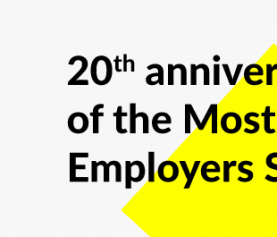March 17th, 2016
Trends are changing constantly and in order to have better results or to gain a competitive advantage when it comes to employment, you have to adapt your recruitment strategies to the workforce. Even if you found your “gold recruitment rule” that you use to implement every year, today it can be less efficient than before.
In this article we will present you statistics and recruitment trends’ predictions that may help you in your recruitment processes.
1. Increased interest in recruiting juniors
According to the study The 2016 Workforce made by Hipo.ro, about 96% of the respondent companies have recruitment plans, and 100 out of 210 estimate an employee raise with over 10%. Moreover, in 2016, over 44% of the companies will develop more programs for juniors (students, fresh graduates or candidates with an experience less than 3 years) and 42% are interested in recruiting seniors, with over 3 years of experience.
Regarding the domains where companies have the most opened positions, these are: IT Software, Sales, Customer Support, Engineering and Accountancy.
2. Bigger willing to develop the employer brand
The main purpose of employer branding is recruiting the best candidates. Nowadays, an important criteria for any job seeker is the company’s image on the market. In order to attract talent, companies have to focus more on employer branding and on the way they communicate in media. Candidates are interested in knowing more about the company’s culture, environment, how their involvement can improve their skills and why should they choose you as an employer to the detriment of other companies.
In order to stand out from the crowd, use the power of your employees in photo or video posts for raising brand awareness and for promoting what really means to work for your company.
3. Recruitment through social media
For better recruitment results, recruiters have to be proactive and search for candidates through Social Media. According to a study made by EY Romania – Social Media and Romanian Business, 74% of the surveyed companies use Social Media for advertising, sales and recruitment and only 21% have included Social Media in their communication strategy. Despite this fact, 32% of the companies don’t have a Social Media strategy.
Social Media started to impact the recruitment process since last year, making a competitive advantage in front of other companies. Corresponding to the Universum research, 35% of the HR managers consider Social Media the most important digital tool for promoting the employer brand and for communicating with candidates.
Moreover, it’s a great instrument for attracting a large candidate pool, including passive candidates – individuals who are not looking for a job in the present, but are open to new opportunities. A useful way to source them is by getting social. Create shareable content that brings value to readers, make people aware of your career opportunities and let them know more about your ongoing projects.
According to an iCIMS study, promoting your job openings on Social Media can increase your candidate applications from 30% to 50%.
4. Millennials, interested in leadership roles
Generation Y is currently the largest generation in the workplace and will comprise 75% of the workforce by 2025. Millennials expect to advance rapidly in their careers and they will occupy the leadership positions in the next future. They are much different than the generations before them and so their opinion about how a manager should look like. They see leadership as empowering others to succeed.
A study made by Virtuali reveals the fact that 71% of Millennials already consider themselves to be leaders. Even if a large number of them don’t feel already prepared to lead, they are in a constant learning and development of their skills.
To keep Millennials engaged, you need to give them freedom to expression and let them see that their work is appreciated and their ideas are implemented. Make them treat your business as their own and you will see a productivity growth.
5. The impact of Generation Z
Another key trend is focusing on the Generation Z recruitment. Even if the most part of them are still in high school, it is a candidate pool that we should take into consideration, because in few years they will represent the major part of consumers. They are the true digital natives and most of them will excel by working independently. Moreover, they are eager to step into the workforce quite fast and build a hobby from their career. Gen Z is more motivated by career advancement rather than money.
Universum Global revealed that a big concern for Gen Z is that they won’t find a job that will match their personality or that will get stuck with no development opportunities. Regarding this, they are thinking of becoming self-employed entrepreneurs and run their own business.
For them is very important to stay connected as much as possible on social networks. This represents another reason for companies to focus more on mobile technology and Social Media platforms.
6. Focus on Mobile Technology
In 2016, mobile apps will become the main technology platform used by recruiters, according to the Bersin Report. In average, people use Internet 5.6 hours a day and 51% of that time is spent on mobile.
According to The Most Desired Employers Survey 2015, 19 % of the Romanian surveyed companies prefer mobile apps as a communication channel, but only 5% of them are using this instrument in the present. Nowadays, job seekers are connected all the time on mobile and they have started to apply to career opportunities by using their smartphones. In order to adapt with the latest changes, a recommendation is to make the career sites and the application forms mobile friendly. If a job application is not mobile optimized, there is a bigger chance for the candidate to give up on his application and reconsider to apply to another company.
7. The “boomerang” effect
Many organizations are confronting with the lack of candidates for closing their positions. Based on survey results, companies started to rehire ex-employees if they receive their job application. This can represent an advantage because a previous employee comes back with more working experience and extensive networks that can be useful for the company. Also, the candidate will accommodate easier with the organizational culture and he will require less training in order to be informed about the intern processes, projects and services.
Recruiting has evolved rapidly in the last 4 years and perhaps other changes will come again. Social and professional networks, employer brand, and passive candidate recruiting will remain the long-lasting trends in recruiting. 46% of global recruiting leaders think that recruiting is becoming more like marketing and that could reshape the recruiting industry.



![What are the recruitment trends in 2016? [En] What are the recruitment trends in 2016? [En]](https://www.catalyst.ro/wp-content/uploads/bfi_thumb/Recruitment-trends-in-2016-mo3pkst3tkximcrxkjemlghs33z1esfk0pnkbn6b2k.png)





